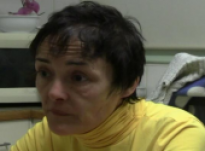Shaz - Interview 08

More about me...
A complicated set of circumstances caused Shaz long-term emotional distress and contributed to her depression.
A complicated set of circumstances caused Shaz long-term emotional distress and contributed to her depression.
Shaz described the isolating nature of depression.
Shaz described the isolating nature of depression.
Shaz's participation in a millinery course made her feel accepted.
Shaz's participation in a millinery course made her feel accepted.
But I started going back to school and I’m studying millinery which is very interesting. And the girls - it’s an all girl group and they are fantastic. There is no bitchiness which normally girls are pretty good at bitching about each other. They back, backstab each other to bits. But these girls, well we’re all more mature women but there is a couple of younger girls but we all help each other, we all borrow each other’s equipment. We all respect each other. We all sit and have lunch together and talk about what we’ve been doing. And that makes me happy. And I really, for the first time in my life feel accepted for what I am.
Shaz described different medications she had tried for her mental health, but didn't know much about their intended effects.
Shaz described different medications she had tried for her mental health, but didn't know much about their intended effects.
Shaz described her experience of being hospitalised for anorexia and being discouraged from making friends with other patients.
Shaz described her experience of being hospitalised for anorexia and being discouraged from making friends with other patients.
Shaz was open to complementary approaches but couldn't afford to pay for them.
Shaz was open to complementary approaches but couldn't afford to pay for them.
I went through a phase where I was seeing a naturopath but the, the only reason I stopped that - I did find it helpful and she was very good, but it’s expensive. See and this is the thing with medicines you can get from your doctors and that, they’re a lot cheaper. But a lot of the medications that they actually supply do come from natural ingredients anyway, you know. So I think they do have - like naturopaths and people like that do have their place in society but um… I think a lot of it’s what your attitude too, like whether you think it will work.

